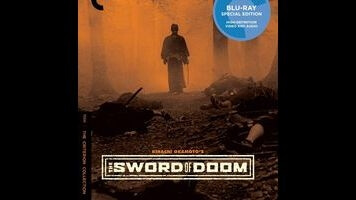The Sword Of Doom lives up to its pulpy American title

Every so often, somebody puts together an amusing list of American movies that sport more purely descriptive titles in other countries. Reportedly, Pretty Woman is known in China as I Will Marry A Prostitute To Save Money; Brazil renamed Lost In Translation as Meetings And Failures In Meetings; Bad Santa became Santa Is A Pervert when it was released in the Czech Republic. These are good for a laugh, but it’s not as if we’re above the practice ourselves. In Japan, Kihachi Okamoto’s 1966 adaptation of a popular, mammoth serial novel—written over three decades, incredibly—has the same prosaic title as its source, variously translated as The Pass Of The Great Buddha or Great Bodhisattva Pass. It’s a place name, in other words, like Barbary Coast or Mulholland Drive. While that probably works fine for the sprawling literary work, however, it doesn’t remotely do justice to the crazed movie, which is appropriately known in the U.S. as The Sword Of Doom. Be advised that this title is not fucking around. “Doom” is exactly right.
The man wielding the sword is a samurai named Ryunosuke, played by the great Tatsuya Nakadai with a chillingly dead-eyed demeanor usually reserved for serial killers. Introduced while casually murdering an old man he finds praying for death, Ryunosuke moves through the world with no apparent feeling or purpose, equipped only with a basic survival instinct and some rudimentary appetites (food, sex). Early in the film, he seduces the wife (Michiyo Aratama) of his opponent (Ichirô Nakatani) in a fencing match—more accurately, he offers to throw the match if she’ll sleep with him—then kills the husband in response to a feeble attack. This turns Ryunosuke into a hunted outlaw, and though he makes his escape from town, dragging the widow along with him, the dead man’s brother (Yûzô Kayama) seeks him out, bent on revenge. Eventually, there isn’t a character on-screen who isn’t actively trying to kill Ryunosuke. The carnage culminates in a swordfight so prolonged and frenzied that it nearly defies belief, as Ryunosake, now clearly deranged, singlehandedly takes on an entire army of assassins.
It’s primarily those final seven minutes—a small eternity for an action sequence that never pauses for breath—that have made The Sword Of Doom a cult favorite. (When Takashi Miike remade Harakiri a few years ago, he even restaged the final battle so that it more closely resembles the one from this film than it does the one in Masaki Kobayashi’s original version.) What makes it more art than exploitation, however—and secured it a place in the Criterion collection, which has now upgraded it for Blu-ray—is Nakadai’s creepy performance, which plays now like the prototype for such sociopaths as Travis Bickle and Anton Chigurh. Nakadai doesn’t have quite the cultural cachet in America that Toshirô Mifune does (even though both worked with Akira Kurosawa many times), but he arguably has an even wider range. Here, he empties himself so completely that it’s impossible to know what Ryunosuke is thinking or feeling until he finally explodes. Okamoto strategically uses Mifune himself in a minor role, as the catalyst for disaster; his character’s combination of nobility and physical prowess shakes Ryunosuke’s self-confidence.
Criterion’s upgraded edition remains unusually skimpy in the supplements department, featuring only the film’s trailer and an audio commentary by historian Stephen Prince. It’s helpful to read the accompanying essay by Geoffrey O’Brien, however, which goes into some detail about Kaizan Nakazato’s source novel and its familiarity to Japanese audiences. Some of what makes The Sword Of Doom seem “arty” to Western viewers—its seeming indifference to niceties of plot and motivation, for example—is the result of Okamoto and his screenwriters opting to skip past large sections of the story, confident that Japanese audiences could fill in the gaps with little trouble. Even the film’s memorable ending, which rivals The 400 Blows in terms of what an unexpected freeze-frame can do to the nervous system, was intended not as an ambiguous provocation but as, in essence, an advertisement for sequels that never wound up being made. In the end, though, none of that really matters. Narrative hiccups aside, the movie works beautifully as is. And it more than fulfills the violent promise of its American title, which is all one could really demand.
The Sword Of Doom is available on DVD and Blu-ray from Criterion. It is also streaming on Hulu Plus.